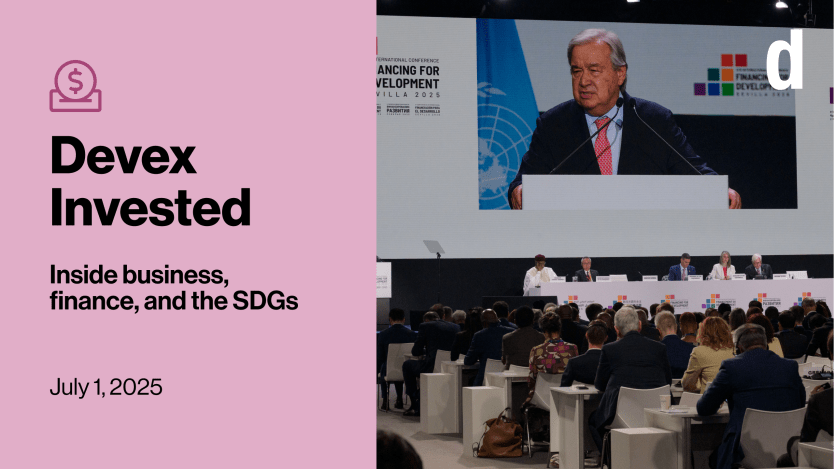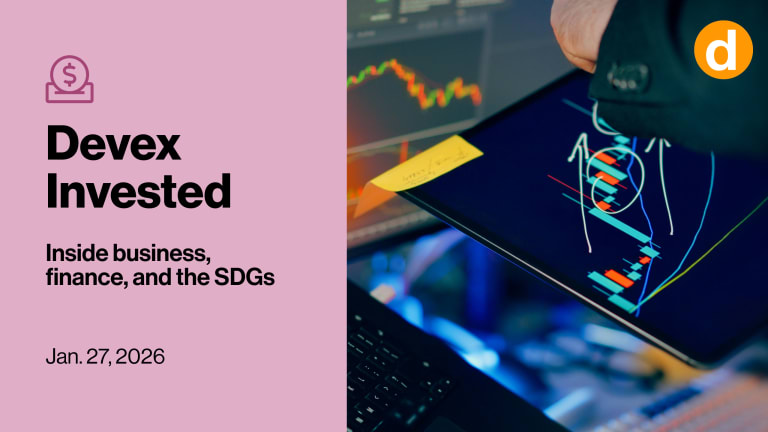
A 32-page list of side events (and 11 pages of virtual events), an outcome document that’s already been agreed, and a nascent Sevilla Platform for Action with 130 initiatives on everything from a global hub for debt swaps to a blended finance platform to a new tool to help multilateral development banks manage local currency lending.
Can anyone make sense of the fourth Financing for Development conference, or FfD4, this week in Spain? Devex reporters Jesse Chase-Lubitz and Elissa Miolene are on the ground in Sevilla to do just that. You can follow the latest developments in our reporter’s notebook, which we’ll be updating regularly.
At a press conference with the Spanish prime minister yesterday, United Nations Secretary-General António Guterres had an interesting take on what’s at stake this week.
“I have a clear message to the powerful,” Guterres said. “It’s better to lead the reform of the system now than to wait and eventually suffer the resistance later when power relations change.”
But those power shifts are already happening.
“It is good that new donors are now stepping up,” said Ursula von der Leyen, president of the European Commission, in her opening remarks in Sevilla. “So why don’t we combine forces and set up joint investment programmes that play on our respective strengths for maximum impact? This is the agreement we have just reached with India, to invest together in third countries. And we will extend the same offer to other rising donors who share our goals.”
The elephant not in the room was the United States, with whom Europe previously co-invested on development megaprojects such as the Lobito Corridor — a rail line to access critical minerals in the Democratic Republic of Congo. After dismantling the U.S. main aid agency and gutting its world-leading aid budget earlier this year, the Trump administration withdrew from the Sevilla process just before the final outcome document was agreed.
But as Jesse pointed out in our special podcast episode recorded on the ground in Sevilla, the U.S. had already made an impact by watering down language on issues such as gender, debt, and climate.
“What we see in this final document as compared to earlier drafts is a lot of softened language,” Jesse said, “some of which even the EU doesn’t really agree with, especially on climate.”
Read: Sevilla reporter's notebook Day 1 — FfD4 kicks off
Listen: FfD4 kicks off as aid budgets shrink and US steps back
Don’t miss: Sevilla sizzles as development leaders define the decade
A new aid superpower
Many are looking to Europe to fill the void. But the continent has its own problems. A European Parliament resolution to take to the Sevilla conference was voted down last month after the center-right European People’s Party — the largest group in the parliament and von der Leyen’s own political clan — objected to a line about the need to constructively engage toward the adoption of the United Nations Treaty on Business and Human Rights.
With von der Leyen’s commission set to announce its all-important proposal for the 2028-2034 budget in the coming weeks, there would have been a few sighs of relief at this line in her speech too: “The European Union provides 42% of the world's development aid. We are proud of this, and our commitment is here to stay.” However, whether that commitment was to the percentage or the numerical amount, she didn’t say.
In a recent opinion piece for Devex, Samy Ahmar and Willy Bergogné from Save the Children argue the EU could be an “aid superpower” if only it found a way to harness the combined resources of its 27 members through the coordinating power of the EU institutions.
Our take: The European Commission would like nothing more! But the recent attempts at so-called Team Europe initiatives, not to mention trying to corral all of the bloc’s various development banks, have shown that harmonization is easier said than done.
Opinion: The EU is an aid superpower. It just doesn’t know it yet
Banking on it
Speaking of development banks, expect much talk this week about MDBs. Again. In an era of shrinking aid budgets, it’s become de rigueur to focus on the potential of players such as the World Bank to make billions to trillions a reality — no matter how much even World Bank President Ajay Banga himself warned that such an approach was “unrealistic” and that it “bred complacency.”
Annalisa Prizzon at ODI Global has been tracking the MDB reform agenda for years. So it’s worth paying attention to her recent analysis of whether Sevilla breaks new ground.
“Member states are encouraging MDBs to increase their finances, potentially tripling them,” she writes. “That means recognising one of the core recommendations of the G20 Independent Expert Group on strengthening MDBs, which was noted but not endorsed or acted upon by G20 members back in 2023.”
But, Prizzon points out, pressure must now be maintained beyond Sevilla to ensure that calls to triple MDBs’ finances “are implemented by the Boards of individual MDBs, building coalitions to achieve the necessary majorities where the space for this exists.”
Is the private sector even there?
Of course, many speakers this week will offer the now-standard qualification that whatever public aid money tries to do to reach the U.N. Sustainable Development Goals, it’s a pittance compared to the potential of the private sector. But is the private sector even part of the conversation in Sevilla, as it might be in Davos or a COP climate summit — or is the global development bubble still largely talking to itself?
Perhaps reassuringly to Invested readers, Jesse tells me that world leaders are joined in Sevilla this week by a lot of private sector reps. Citigroup and J.P. Morgan are among those walking the aluminum halls of the FIBES Conference Center today, and they all agree on one thing: Development finance is not dead.
“Public finance needs to redirect to places where there is no financial gain,” says Faheen Allibhoy, managing director and global head of multilateral and development institutions at J.P. Morgan. “ODA is never going to be enough to get these countries to the next level. So I think much more focus needs to be on technical assistance rather than just the financing.”
But Andrew Wilson, the global policy director at the International Chamber of Commerce, had a different take. ICC — which represents 45 million businesses and is the first business entity with observer status at the United Nations General Assembly — accredited 75 businesses within its network to come to FfD4, Wilson says. Ultimately, 25 of those businesses showed up.
“I just don’t think there’s the same level of interest and excitement as there was in 2015,” Wilson says. “What is the return on investment for businesses being here? I think that in broad brush terms, obviously the financial sector is here. But I don’t think it’s here in force.”
+ Check out our page for all the latest news, events, interviews and briefings from FfD4.
Who else is there?
At least Devex’s ground game in Sevilla is strong, hosting an exclusive gathering space for leaders — Casa Devex — through today at a historic Spanish villa. More information here.
An interesting subplot in the run-in to Sevilla was the implications for the OECD Development Assistance Committee, the 33-nation group that sits in Paris setting the rules on what does and doesn’t count as official development assistance, or ODA.
Your next job?
Compensation Specialist
Development Bank of Latin America and the Caribbean (CAF)
Argentina | Bolivia | Colombia | Chile | Ecuador | Uruguay | Paraguay
Remember a year ago, when the French development agency AFD and the Center for Global Development hosted a Chatham House rules-style gathering at which, according to a public summary: “Many questioned the credibility of the DAC-led model of ODA decision-making, which necessarily prioritizes the interests of historical providers without seeking input on proposed changes from partner countries or more recent providers.”
Judging by his comments in an interview with Devex President and Editor-in-Chief Raj Kumar yesterday, DAC chair Carsten Staur appears to have got the memo. A wide-ranging review of DAC itself was announced yesterday too.
“ODA needs to change, and DAC needs to change as well,” Staur said. How? Well, far from shutting up shop, Staur appeared in expansion mode, floating the idea of the DAC helping to coordinate the new cast of players pursuing the SDGs.
“We don't need 100 different private foundations going in 100 different directions,” he said. “We need some common direction on this. And I think the DAC, with all the 60 years of work that we have been doing on these issues, we can provide some guidance on that.”
Watch: OECD’s Carsten Staur says we’re ‘at the brink of a new paradigm’
Also watch: Head of France’s AFD reflects on development finance's uneven evolution (Pro)
+ Not yet a Pro member? Start your 15-day free trial today to access all our expert analyses, insider reporting, funding data, exclusive events and briefings with sector leaders and influencers, and more.
What we’re reading
As FfD4 begins in Sevilla, a hard-won agreement sets the stage — but questions over financing and follow-through linger. [Devex]
Spain’s aid budget is rising — but has a long way to go. [Devex]
France is launching a coalition for premium flyers’ contribution to fair transitions and resilience. [Élysée]
Elissa Miolene and Jesse Chase-Lubitz contributed to this edition of Devex Invested.
Search for articles
Most Read
- 1
- 2
- 3
- 4
- 5








